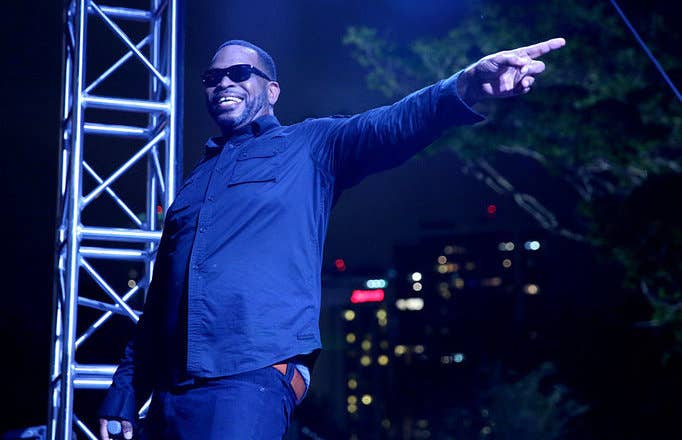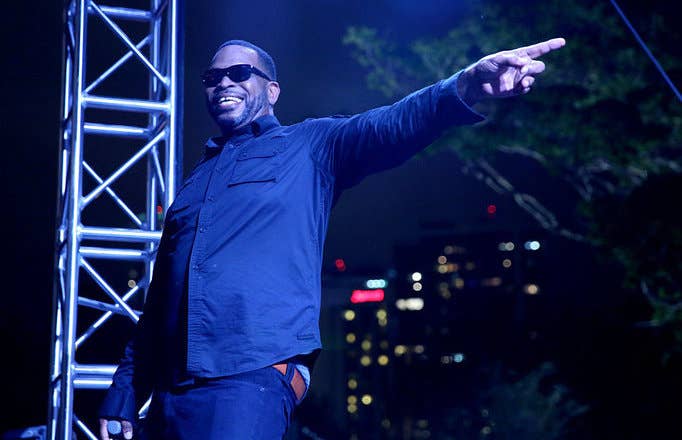
The entertainment world is mourning the loss of Hugh Hefner, sexual freedom advocate, civil rights and black culture supporter, and all-around innovator in the publishing industry. Hefner died of natural causes Wednesday; he was 91 years old. Along with former Playboy cover girls, Playboy Mansion party attendees, and business associates, hip-hop artists have been paying their respects on social media:
RIP Hugh Hefner I went to so many of his parties at the Playboy mansion it was legendary you will never be forgotten
RIP Hugh Hefner the legend of all legends 🐰
Luther "Uncle Luke" Campbell, Miami bass legend and member of the highly controversial but pioneering 2 Live Crew, also expressed his condolences via social media.
I would like to give my condolence to the Hugh Hefner family a true Pioneer for free speech and the adult entertainment nothing but class
Like Hefner, Luke is no stranger to the adult-entertainment space. While Hefner was prolific and influential in publishing, Luke and 2 Live Crew impacted the rap game and forever changed the music industry as a whole after the U.S. 11th Circuit Court of Appeals overturned a 1990 federal ruling that declared 2 Live Crew's sexually explicit album As Nasty as They Wanna Be was "obscene." The case set a precedent for artistic freedom, allowing Luke & co. to continue creating work that encouraged consumers to embrace the sexual parts of life instead of shying away, much like Hefner did with Playboy.
Complex reached out to Uncle Luke to talk about the legacy of Hugh Hefner, his impact on hip-hop culture, and how he relates to Hefner's battle for sexual freedom and liberation.
What were some of your first thoughts when you heard the news of Hugh Hefner's passing?
That an icon had passed away. A guy who I always looked up to for the grace and the class he always carried himself with. He was a freedom fighter, a guy who fought for free speech when guys like [Larry] Flynt and myself were being attacked for what we do in the adult-entertainment industry.
Do you feel like he opened the door for you in a way?
No doubt about it. Everything about me coming into the hip-hop business—most guys were rapping about "broken glass everywhere," doing music videos in front of trains and graffiti. As a kid, when I wasn't supposed to be looking at Playboy magazine, I was sneaking around looking at it. And once I started growing up, I started reading up on this guy, and I was like, "This is what I want to bring to the hip-hop business."
I wanted to bring this Hugh Hefner look to it. So, a large part of everything I did in the business, what I brought different in the hip-hop business, was inspired by Hugh Hefner, with the girls and celebrities. A lot of people called me the black Hugh Hefner, and I would be flattered by it. I looked at the way he did it. It was always classy and tasteful. It wasn't really grimy, and his look, the type of women, the type of celebrity parties he would have, I looked at as what I wanted to bring to hip-hop. Something totally different.
Did you ever have any conversations or spend time with him before he passed?
No. Not at all. There was an award that he gave me at some adult-entertainment convention in L.A. for my fight for free speech. There were a lot of articles being done where I was being attacked years ago, and he would have comments on it. And I always looked at that, and I knew that he was following my story.
He directly impacted you, and you in turn impacted the hip-hop industry, but do you have any thoughts on how Hugh specifically, and Playboy in general, left a mark on hip-hop?
Oh, man. It left a serious mark. Everybody wants to be like Hugh Hefner, but at the same time everybody can't be Hugh Hefner. Hugh was one of a kind. The mark that he left on the business—the style, the grace, and the beautiful ladies—but at the same time, the business part of it. When you think about Hugh Hefner, from my point of view and what I tried to bring to the hip-hop industry, it ain't just about beautiful, naked ladies. It's about business.
This guy started a big television network. He started with the magazine, then he created this big empire. At the same time, he's getting his family, his daughter to run this big empire. So the business part of it, I was always more fascinated by, and I think people in the hip-hop business who follow Hugh Hefner probably would be more fascinated by the business side of it more so than the girls, and the parties at the mansion, and everything like that.
I can do this with a bunch of beautiful ladies around, but at the same time it's business. We are giving the people what they want, in a classy and tasteful way. So, how do you expand on that business and continue the same model of everything you exercised in the magazine? I was always fascinated by that. If there were any hip-hop artists who looked at it in that way, a lot of them look at it from that perspective when they look at me, because I was the guy to start a business when most artists were basically signed up with labels. So they looked at me, and I just took the Hugh Hefner model. I wanted to take this, and expand on it in more ways than one.
Where do you think this world would be if Hugh Hefner had never been Hugh Hefner?
I think we would probably want to see the grimy part of the adult-entertainment industry, and not the classy part of it. Hugh brought the classy part of it, you know what I'm saying? He made adult entertainment classy, and tastefully done. He made it acceptable to everyone in a classy way. We would probably be in the ages of underground dirty pimps on the streets treating women in a disrespectful way. Hugh brought class with it, and entrepreneurship. He empowered those women.
When you look at a lot of those women, they went off and did great things in their lives. If you were a centerfold in Playboy, you can name countless top actresses right now today, that puts you on a whole other level. That could launch your career. If it wasn't for Hugh Hefner to be able to allow women to have so much power and control over their sexuality and be able to empower themselves, it would be something different. I think we would be in the dark ages of sexuality. It would probably be bad right now. Anything remotely close to women in a magazine would be those back pages. We would still be stuck in the back pages where everything was so disgusting.
There's only 2 players left me and Larry Flynt R.I.P Hugh Hefner
In a tweet, you said there are only two players left: you and Larry Flynt. Do you have any communication with him at all?
No. I talked to him one time before some years ago. I would love to have some more conversations with him. Guys like him, you want to pick their brain because they just have so much information, so much business information. Me and Flynt are probably more alike than anything in the world because they put us in jail. [Laughs.] Hugh always stayed out of jail. He was like our little brother that never got put in jail because he did it in a different kind of way. I have to have a good sit-down with him as soon as possible.
Is there anything else you'd like to say?
We lost a great icon. I just wish his family well. And continue to help the brand, because we all are Hugh Hefner right now.

